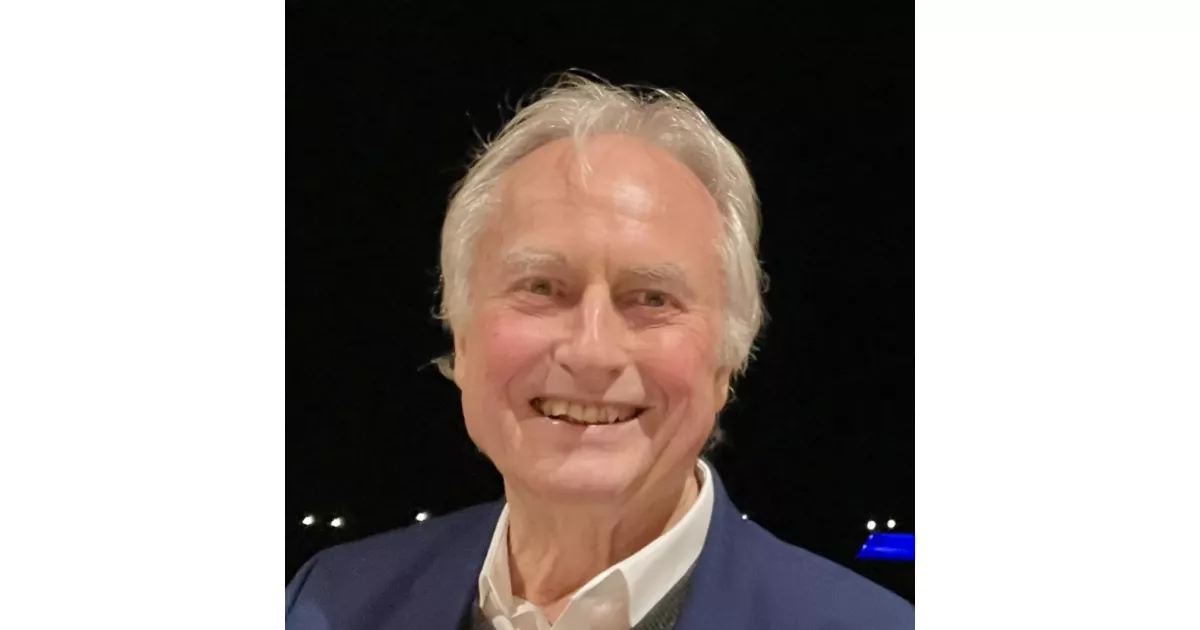Richard Dawkins is a prominent British evolutionary biologist known for his work on gene-centered evolution and the concept of memes. He served as the Professor for Public Understanding of Science at the University of Oxford and has authored influential books, including "The Selfish Gene." Dawkins's contributions to science have earned him numerous awards and recognition.
1915: Birth of Richard Dawkins's Father
Clinton John Dawkins, Richard Dawkins's father, was born in 1915.
1916: Birth of Richard Dawkins's Mother
Jean Mary Vyvyan, Richard Dawkins's mother, was born in 1916.
1926: Concept of Mneme in The Life of the White Ant
In 1926, Maurice Maeterlinck's work The Life of the White Ant mentioned the term 'mneme' to explain memory in termites and ants, a concept he derived from Richard Semon's work. Semon's 'mneme' referred to inherited neural memory traces, a view seen as Lamarckian by modern biologists.
1949: Dawkins Family Moves to England
Richard Dawkins's family moved back to England from Nyasaland in 1949.
1954: Richard Dawkins Attends Oundle School
Richard Dawkins started attending Oundle School in Northamptonshire in 1954.
1959: Richard Dawkins Completes Oundle School
Richard Dawkins completed his education at Oundle School in Northamptonshire in 1959.
1962: Graduation from Balliol College, Oxford
Richard Dawkins graduated from Balliol College, Oxford, with a degree in zoology in 1962.
1966: Richard Dawkins Receives Doctor of Philosophy Degree
Richard Dawkins received his Doctor of Philosophy degree in 1966.
August 1967: First Marriage
Richard Dawkins married ethologist Marian Stamp on August 1967 in Annestown, County Waterford, Ireland.
1967: Assistant Professor at UC Berkeley
Richard Dawkins began working as an assistant professor of zoology at the University of California, Berkeley, in 1967.
1969: End of Tenure at UC Berkeley
Richard Dawkins concluded his role as an assistant professor at the University of California, Berkeley in 1969.
1970: Return to Oxford as Lecturer
Richard Dawkins returned to the University of Oxford as a lecturer in 1970.
1976: Publication of "The Selfish Gene"
Richard Dawkins published his influential book, "The Selfish Gene", in 1976, popularizing the gene-centered view of evolution.
1986: Oxford Union Debate
In 1986, Richard Dawkins participated in an Oxford Union debate alongside John Maynard Smith, opposing A.E. Wilder-Smith and Edgar Andrews on the topic of creationism.
1986: Publication of "The Blind Watchmaker"
In 1986, Richard Dawkins published "The Blind Watchmaker", arguing against the watchmaker analogy and for evolution.
1987: Literary Recognition and Television Success
In 1987, Richard Dawkins received significant accolades for his work. He was honored with the Royal Society of Literature award and the Los Angeles Times Literary Prize for his impactful book "The Blind Watchmaker." Further solidifying his influence in scientific communication, he earned a Sci. Tech Prize for Best Television Documentary Science Programme of the Year for his contribution to the BBC's Horizon episode, also titled "The Blind Watchmaker."
1989: Delivers Henry Sidgwick Memorial Lecture
Richard Dawkins delivered the Henry Sidgwick Memorial Lecture in 1989.
1989: Zoological Society of London's Silver Medal
Richard Dawkins was recognized for his contributions to zoology with the Zoological Society of London's Silver Medal in 1989.
1990: Delivers First Erasmus Darwin Memorial Lecture
Richard Dawkins delivered the first Erasmus Darwin Memorial Lecture in 1990.
1990: Finlay Innovation Award and Michael Faraday Award
Richard Dawkins received two significant awards in 1990, the Finlay Innovation Award and the Michael Faraday Award, highlighting his innovative work in science communication.
1990: Becomes Reader in Zoology at Oxford
Richard Dawkins's position at Oxford advanced to Reader in Zoology in 1990.
1991: Delivers Michael Faraday Lecture and Royal Institution Christmas Lectures for Children
Richard Dawkins delivered the Michael Faraday Lecture in 1991. In the same year, he also gave the Royal Institution Christmas Lectures for Children on Growing Up in the Universe.
1992: Delivers T. H. Huxley Memorial Lecture
Richard Dawkins delivered the T. H. Huxley Memorial Lecture in 1992.
1992: Third Marriage
Richard Dawkins married actress Lalla Ward in Kensington and Chelsea, London in 1992.
1992: In Praise of Reason Award
The Committee for Skeptical Inquiry (CSICOP) bestowed their highest honor, the In Praise of Reason Award, upon Richard Dawkins in 1992, recognizing his significant contributions to promoting critical thinking and scientific skepticism.
1994: Nakayama Prize
In 1994, Richard Dawkins was awarded the Nakayama Prize, further solidifying his international recognition for contributions to science.
1995: Appointment as Simonyi Professor for the Public Understanding of Science
Richard Dawkins was appointed Simonyi Professor for the Public Understanding of Science at Oxford in 1995.
1996: Humanist of the Year Award
In 1996, Richard Dawkins received the prestigious Humanist of the Year Award from the American Humanist Association.
1996: Honorary Doctorate from Australian National University
Richard Dawkins received an honorary doctorate of letters (HonLittD) from the Australian National University in 1996.
1997: Delivers Irvine Memorial Lecture
Richard Dawkins delivered the Irvine Memorial Lecture in 1997.
1997: International Cosmos Prize
Richard Dawkins received the prestigious fifth International Cosmos Prize in 1997, acknowledging his global impact on scientific thought and understanding.
1997: Fellow of the Royal Society of Literature
Richard Dawkins was elected as a Fellow of the Royal Society of Literature in 1997.
1998: Support for Criticism of Postmodernism
In 1998, Dawkins publicly praised books critical of postmodernism in academia, aligning himself with the views expressed in "Higher Superstition" and "Intellectual Impostures."
1998: Publication of "Unweaving the Rainbow"
Richard Dawkins published "Unweaving the Rainbow" in 1998, arguing against the notion that scientific explanation diminishes the beauty of the natural world.
2000: W.D. Hamilton's Death and Tribute
Following the death of his friend and influential figure W.D. Hamilton in 2000, Richard Dawkins penned his obituary and organized a secular memorial service, demonstrating their close bond and shared intellectual pursuits.
2001: Kistler Prize and Medal of the Presidency of the Italian Republic
In 2001, Richard Dawkins's work earned him two significant honors: the Kistler Prize, recognizing his contributions to understanding the human condition, and the Medal of the Presidency of the Italian Republic, highlighting his international influence.
2001: Fellow of the Royal Society
Richard Dawkins was elected as a Fellow of the Royal Society (FRS) in 2001.
February 2002: TED Talk on Militant Atheism
In February 2002, Richard Dawkins delivered a TED talk titled 'Militant Atheism,' urging atheists to openly state their position and combat the incursion of religion into politics and science.
2002: Bicentennial Kelvin Medal
Richard Dawkins was presented with the Bicentennial Kelvin Medal from The Royal Philosophical Society of Glasgow in 2002, celebrating his outstanding contributions to science and philosophy.
2003: Delivers Tanner Lectures
Richard Dawkins delivered the Tanner Lectures in 2003.
2003: Opposition to the Iraq War
Richard Dawkins expressed his opposition to the 2003 invasion of Iraq.
2003: Publication of "A Devil's Chaplain" Dedicated to Stephen Jay Gould
Richard Dawkins published "A Devil's Chaplain" in 2003, dedicating a significant portion of the book to Stephen Jay Gould, who had passed away the previous year.
2003: Richard Dawkins Award Established
Since 2003, the Atheist Alliance International has presented an annual award named in Richard Dawkins's honor. The Richard Dawkins Award recognizes an individual whose work has significantly raised public awareness of atheism, highlighting Dawkins's lasting impact in this domain.
December 2004: Interview with Bill Moyers
In December 2004, Richard Dawkins gave an interview with American journalist Bill Moyers, where they discussed the certainty of evolution, with Dawkins drawing an analogy to a detective solving a murder based on evidence.
2004: Establishment of the Dawkins Prize
Balliol College, Oxford established the Dawkins Prize in 2004, awarded for research in animal ecology and behavior.
2004: Top Public Intellectual
In a testament to his influence, Richard Dawkins topped Prospect magazine's 2004 list of the top 100 public British intellectuals, based on a readers' poll, demonstrating his significant public profile.
2004: Delivers Tinbergen Lecture
Richard Dawkins delivered the Tinbergen Lecture in 2004.
2005: Shakespeare Prize
The Hamburg-based Alfred Toepfer Foundation awarded Richard Dawkins the Shakespeare Prize in 2005, recognizing his ability to present scientific knowledge in a clear and accessible manner.
2006: Founding of the Richard Dawkins Foundation for Reason and Science
In 2006, Dawkins founded the Richard Dawkins Foundation for Reason and Science (RDFRS) to support research on the psychology of belief and religion, scientific education, and secular charitable organizations.
2006: Publication of The God Delusion
In 2006, Richard Dawkins published The God Delusion, which became an international bestseller and a cornerstone of the New Atheism movement. The book argues against the existence of a supernatural creator and describes religious faith as a delusion.
2006: Lewis Thomas Prize for Writing about Science
In 2006, Richard Dawkins received the Lewis Thomas Prize for Writing about Science, honoring his exceptional skill in communicating complex scientific concepts to a broader audience.
2006: Publication of "The God Delusion" and Founding of the Richard Dawkins Foundation for Reason and Science
Richard Dawkins published "The God Delusion" in 2006, arguing against the existence of a supernatural creator. He also founded the Richard Dawkins Foundation for Reason and Science in the same year.
2006: Golden Plate Award
The American Academy of Achievement recognized Richard Dawkins's remarkable achievements by awarding him the Golden Plate Award in 2006.
September 2007: The Four Horsemen Discussion
On 30 September 2007, Richard Dawkins met with Christopher Hitchens, Sam Harris, and Daniel Dennett at Hitchens's residence for a private discussion that was later titled 'The Four Horsemen.' The conversation lasted two hours and focused on atheism and religion.
2007: Release of "The Enemies of Reason"
Dawkins released the documentary "The Enemies of Reason" in 2007, criticizing what he perceived as an increase in superstitious thinking in Britain.
2007: Author of the Year and Time 100
Richard Dawkins's influence continued to grow in 2007 as he was named Author of the Year at the Galaxy British Book Awards. Additionally, Time magazine included him in their list of the 100 most influential people in the world, further solidifying his global impact. He was also recognized for his intellectual prowess by securing the 20th position on The Daily Telegraph's list of 100 greatest living geniuses.
September 2008: Retirement and Announcement of Book Project
Richard Dawkins retired from his professorship in September 2008 and announced plans to write a children's book about critical thinking.
2008: Atheist Bus Campaign
In 2008, Richard Dawkins supported the Atheist Bus Campaign, an initiative to place atheist advertisements on London buses.
2008: Shortlisted for Top Public Intellectual
Richard Dawkins maintained his influential position in public thought, as evidenced by his shortlisting in Prospect magazine's 2008 poll for the top 100 public intellectuals.
2008: Retirement from Professorship
Richard Dawkins retired from his professorship at Oxford in 2008.
2009: Nierenberg Prize for Science in the Public Interest
In 2009, Richard Dawkins received the Nierenberg Prize for Science in the Public Interest, a testament to his commitment to communicating scientific ideas to a wider audience.
2009: Liberal Democrats Conference Speech
In 2009, Richard Dawkins spoke at the Liberal Democrats conference, criticizing blasphemy laws, alternative medicine, and faith schools.
2009: Atheist Bus Campaign Continued
Richard Dawkins continued his support for the Atheist Bus Campaign in 2009.
February 2010: Honorary Board of Atheist Alliance International
Richard Dawkins's contributions to atheism were formally acknowledged in February 2010 when he was appointed to the Freedom From Religion Foundation's Honorary Board of distinguished achievers.
June 2010: Participation in "Genius of Britain"
In June 2010, Richard Dawkins appeared in the television series "Genius of Britain," alongside other prominent scientists.
2010: Endorsement of Liberal Democrats
In the 2010 UK general election, Dawkins officially endorsed the Liberal Democrats, supporting their stance on electoral reform and secularism.
2010: Death of Richard Dawkins's Father
Richard Dawkins's father, Clinton John Dawkins, passed away in 2010.
2011: Joins New College of the Humanities
Richard Dawkins joined the professoriate of the New College of the Humanities, a private university in London, in 2011.
June 2012: Criticism of E.O. Wilson's Book
Richard Dawkins publicly criticized fellow biologist E. O. Wilson's book "The Social Conquest of Earth" in June 2012 for misinterpreting the theory of kin selection.
September 2012: New College of the Humanities Opens
The New College of the Humanities, where Richard Dawkins joined the professoriate, officially opened in September 2012.
2012: Fish Genus Named in Honor
In 2012, a team of Sri Lankan ichthyologists, led by Rohan Pethiyagoda, paid tribute to Richard Dawkins's contributions to science by naming a new genus of freshwater fish after him: Dawkinsia. This gesture underscored Dawkins's impact on the scientific community.
2013: World's Top Thinker
A 2013 Prospect magazine poll named Richard Dawkins the world's top thinker. This recognition, based on a panel of experts predominantly from the US and UK, solidified Dawkins's position as a leading intellectual figure.
2013: Controversial Tweet about Muslims
In 2013, Richard Dawkins faced backlash after tweeting that Muslims worldwide had fewer Nobel Prizes than Trinity College, Cambridge. The tweet was criticized for being insensitive and sparked significant controversy.
2013: Publication of "An Appetite for Wonder"
Richard Dawkins published his first memoir, "An Appetite for Wonder", in 2013.
May 2014: Dawkins Discusses Theistic Probability at Hay Festival
In May 2014, Richard Dawkins explained at the Hay Festival in Wales that he is a 'de facto atheist' with a theistic probability rating of 6.9 out of 7. He stated that while he does not believe in the supernatural elements of Christianity, he retains nostalgia for its ceremonial aspects.
2014: Joining Asteroid Day Movement
Richard Dawkins became a signatory of the Asteroid Day movement in 2014.
2015: Sales Milestone for The God Delusion
By 2015, more than three million copies of Richard Dawkins's book The God Delusion had been sold, and it had been translated into over 30 languages, reflecting its significant cultural impact.
2015: Rachel Dolezal Controversy
Rachel Dolezal, a white NAACP chapter president, faced significant criticism for identifying as Black.
2015: Publication of "Brief Candle in the Dark"
Richard Dawkins published his second memoir, "Brief Candle in the Dark", in 2015.
January 2016: Merger of RDFRS with Center for Inquiry
In January 2016, it was announced that the Richard Dawkins Foundation for Reason and Science (RDFRS) would merge with the Center for Inquiry. Richard Dawkins joined the board of directors of the new organization.
February 2016: Minor Stroke
Richard Dawkins experienced a minor haemorrhagic stroke at his home on February 2016.
2016: Media Appearances and Public Engagement
As of 2016, Richard Dawkins had a substantial media presence, with over 60 credits on the Internet Movie Database. He frequently appeared on news programs, radio shows, and university lectures, expressing his views on atheism, politics, and other topics. Dawkins engaged in numerous debates with religious figures, showcasing his commitment to public discourse and intellectual exchange.
2016: Disinvitation from the Northeast Conference on Science and Skepticism
In 2016, Richard Dawkins was disinvited from speaking at the Northeast Conference on Science and Skepticism after sharing a video that was deemed highly offensive. The video satirically depicted feminist and Islamist characters, leading to widespread criticism.
2016: Criticism from British Scientists
In 2016, a study revealed that many British scientists held an unfavorable view of Richard Dawkins and his confrontational attitude toward religion. Critics argued that his approach was narrow and 'embarrassing,' equating him with the religious fundamentalists he criticized.
2016: Separation from Third Wife
Richard Dawkins and Lalla Ward separated in 2016, describing their separation as "entirely amicable".
2017: Renewed Endorsement of Liberal Democrats
Leading up to the 2017 general election, Dawkins reiterated his endorsement for the Liberal Democrats.
2019: Death of Richard Dawkins's Mother
Richard Dawkins's mother, Jean Mary Vyvyan, passed away in 2019.
April 2021: Controversial Tweet on Gender Identity
In April 2021, Dawkins posted a tweet comparing Rachel Dolezal's racial identity claims to transgender identities, leading to backlash and the retraction of his 1996 Humanist of the Year Award.
2021: Rescinded Award
In 2021, the American Humanist Association made the controversial decision to withdraw the Humanist of the Year Award previously given to Richard Dawkins in 1996. The organization stated that Dawkins had "demean[ed] marginalized groups," particularly transgender people, under "the guise of scientific discourse."
2024: Criticism of "Sex Assigned at Birth" Terminology
In 2024, Dawkins co-authored an op-ed in The Boston Globe with Alan Sokal, criticizing the use of "sex assigned at birth" and defending the objectivity of biological sex.
Mentioned in this timeline
California is a U S state on the Pacific Coast...

Christmas is an annual festival celebrated on December th commemorating...

Los Angeles is the most populous city in California and...
Iraq officially the Republic of Iraq is a West Asian...

News encompasses information about current events disseminated through various media...
Kenya officially the Republic of Kenya is an East African...
Trending

21 minutes ago Magda Linette Advances to WTA Dubaj Round 2, Fr?ch Eliminated, Other Final Matches

21 minutes ago Clara Tauson vs. Peyton Stearns: WTA Dubai 2026 Match Prediction and Preview

1 hour ago Jessica Pegula faces Varvara Gracheva in Dubai Tennis Championships second round.

1 hour ago NASA Warns of Undetected City-Killer Asteroids Posing Threat to Earth

1 hour ago Coco Gauff anticipates Dubai struggles, faces Kalinskaya; Alexandrova trending in WTA Dubai.
3 hours ago Canada vs New Zealand T20 World Cup 2026: Thrill, Live Scores, and Game Updates.
Popular
Randall Adam Fine is an American politician a Republican who...

Pam Bondi is an American attorney lobbyist and politician currently...

Kid Rock born Robert James Ritchie is an American musician...

Barack Obama the th U S President - was the...
The Winter Olympic Games a major international multi-sport event held...

XXXTentacion born Jahseh Dwayne Ricardo Onfroy was a controversial yet...
